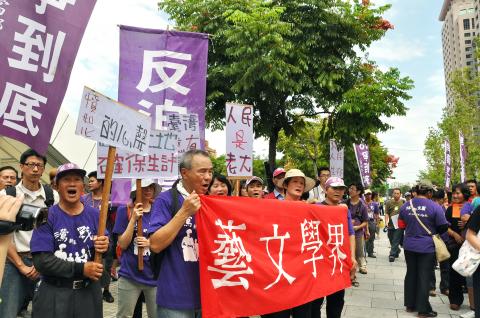Dozens of supporters of San-ying Aboriginal Community (三鶯部落) — including social activists, students, musicians, writers, artists, film directors and academics — yesterday visited the campaign headquarters of both the Democratic Progressive Party (DPP) and Chinese Nationalist Party (KMT) Sinbei mayoral candidates Tsai Ing-wen (蔡英文) and Eric Chu (朱立倫) to ask them to clarify their stand on the relocation of their community.
The Sanying Aboriginal Community is a small community where the vast majority of residents are Amis Aborigines from Hualien and Taitung counties who moved to Taipei to work as construction workers and miners about 30 years ago.
Since they could not afford housing in the city, they found a plot of unused land next to -Sanying Bridge (三鶯大橋) on the Dahan River (大漢溪) and built their own houses using whatever material they could find.

Photo: Kuo Yen-hui, Taipei Times
Over the past decade, the community has been razed by the county government several times as the houses were illegally constructed in a restricted zone. However, residents rebuilt their homes each time the village was flattened.
Although the county government built a block of rental apartments not far from the original Sanying Community for residents to move into, many continue to prefer the riverside village saying they could not afford the rent and utility bills.
As the issue remains unresolved, residents are keen to know how the future mayor plans to handle the issue.
“What we’re asking for is simple: Either allow the residents to stay where they are or find another plot of land for them to relocate,” said Chiang Yi-hau (江一豪), a core member of the Sanying Community Self-Help Association.
“We can discuss more details such as how to rent the land collectively, but at the very least we would like to know what they have in mind,” he said.
Film director Hou Hsiao-hsien (侯孝賢) said that “Aborigines are the real masters of this island” and deserve more respect from the government.
Writer Chu Tien-hsin (朱天心) pledged she would stand shoulder to shoulder with Sanying Community.
Eric Chu’s campaign spokesman Chang Chi-kai (張啟楷) received the activists and promised that the- candidate would visit the community in person within a week — but declined to say whether it would be an open visit.
More than 200 Sanying residents and activists visited the two campaign headquarters on Oct. 9, and both candidates promised to visit the community within two weeks, but failed to do so.
A staffer at Tsai’s campaign office, Tseng Tsung-kai (曾琮愷), met with the activists and promised that the office “will send someone to the community within a week.”
Tsai commented to the media in a separate setting later that “making promises [about Sanying Community] during the campaign is unrealistic.”
“To solve the Sanying issue, I must have a better understanding of it and take into consideration Aboriginal culture and the residents’ wishes,” she said.

Taiwanese can file complaints with the Tourism Administration to report travel agencies if their activities caused termination of a person’s citizenship, Mainland Affairs Council Minister Chiu Chui-cheng (邱垂正) said yesterday, after a podcaster highlighted a case in which a person’s citizenship was canceled for receiving a single-use Chinese passport to enter Russia. The council is aware of incidents in which people who signed up through Chinese travel agencies for tours of Russia were told they could obtain Russian visas and fast-track border clearance, Chiu told reporters on the sidelines of an event in Taipei. However, the travel agencies actually applied

Japanese footwear brand Onitsuka Tiger today issued a public apology and said it has suspended an employee amid allegations that the staff member discriminated against a Vietnamese customer at its Taipei 101 store. Posting on the social media platform Threads yesterday, a user said that an employee at the store said that “those shoes are very expensive” when her friend, who is a migrant worker from Vietnam, asked for assistance. The employee then ignored her until she asked again, to which she replied: "We don't have a size 37." The post had amassed nearly 26,000 likes and 916 comments as of this

New measures aimed at making Taiwan more attractive to foreign professionals came into effect this month, the National Development Council said yesterday. Among the changes, international students at Taiwanese universities would be able to work in Taiwan without a work permit in the two years after they graduate, explainer materials provided by the council said. In addition, foreign nationals who graduated from one of the world’s top 200 universities within the past five years can also apply for a two-year open work permit. Previously, those graduates would have needed to apply for a work permit using point-based criteria or have a Taiwanese company

The Shilin District Prosecutors’ Office yesterday indicted two Taiwanese and issued a wanted notice for Pete Liu (劉作虎), founder of Shenzhen-based smartphone manufacturer OnePlus Technology Co (萬普拉斯科技), for allegedly contravening the Act Governing Relations Between the People of the Taiwan Area and the Mainland Area (臺灣地區與大陸地區人民關係條例) by poaching 70 engineers in Taiwan. Liu allegedly traveled to Taiwan at the end of 2014 and met with a Taiwanese man surnamed Lin (林) to discuss establishing a mobile software research and development (R&D) team in Taiwan, prosecutors said. Without approval from the government, Lin, following Liu’s instructions, recruited more than 70 software